Larry Anderson Talks… "Life" (And Work) "With Lucy," Lee Majors, "Charlie's Angels," Bill Bixby, "Happy Days," and More - Herbie J Pilato
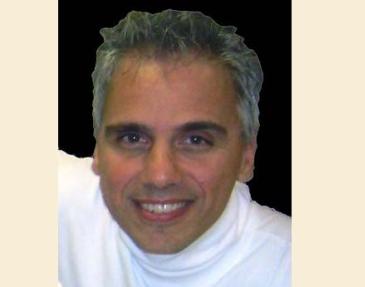
Larry Anderson is a multi-talented performer, actor, director, magician, and TV host. As his professional biography reveals, he was just eleven-years-old when he delved into show business after seeing a magician perform at a Cub Scout function. By the time he was fourteen he was performing magic professionally, and over the next six years developed a reputation as one of the hottest young entertainers in Minneapolis and St. Paul.
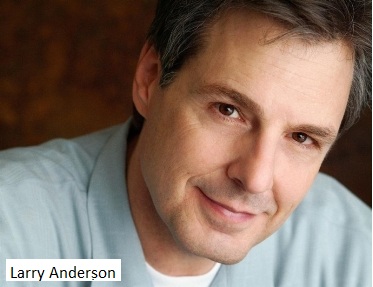
In time, Hollywood called, and Larry landed a job with nationally known magician and president of an emerging entertainment company, Mark Wilson. Among his many assignments was serving as the technical advisor for film and television projects incorporating magic as part of their theme. As consultant and teacher to Bill Bixby on the NBC series The Magician, which aired in the 1970s, Larry appeared in many of the episodes, opening his eyes to a whole new career: acting.
Larry's big break arrived when he landed one of the lead roles in his first TV series - another show for NBC, this one a sitcom titled Brothers and Sisters. This series lasted only one season but opened the door to several guest-star appearances on classic TV shows like, Charlie's Angels, The Six Million Dollar Man, Happy Days, Knight Rider, Mork and Mindy, The A-Team, Matlock, Night Court, Beverly Hills 90210, Boston Public, The O.C., Raising The Bar, Desperate Housewives, Mad Men, Everybody Loves Chrisand more, including Star Search - which was the precursor to today's American Idol.
In between it all, circa 1986, Larry auditioned for and was chosen by producer Aaron Spelling (who brought the world the aforementioned Charlie's Angels, along with The Mod Squad, The Love Boat, Fantasy Island, and countless others) and the legendary Lucille Ball to play her son-in-law on the ABC sitcom Life with Lucy. Like Brothers and Sisters, Lifelasted only one season, but afforded Larry a fateful guest appearance on The Tonight Show starring Johnny Carson. For watching at home that night was TV's iconic host and producer Ralph Edwards (This Is Your Life) who, based on Larry's "magical" eight minutes with Carson , hired him as host of the new Truth or Consequences.
Since then, Larry hosted a weekly water-sports series for the Travel Channel entitled Get Wet and other game shows including the California Lottery's Big Spin, and Trivia Track for the Game Show Network. On the big screen, Larry also appeared in films such as Star Trek: Insurrection.
In recent years, Larry has hosted or been the "product expert" on numerous successful infomercial campaigns. Among these are George Foreman's Party Grill and Rotisserie Oven shows, Wagner'sWall-Magic Home Decorating System, Time-Life Music's Rock & Roll Era, AM Gold, and Classic Love Songs of The 60's shows, and the I-DAPZ Active Eyewear System. Larry's favorite Infomercial is one he wrote, produced, and stars in titled JawDroppers - a set of how-to videotapes teaching anyone to perform jaw-dropping magic tricks with everyday items.
Larry now shares some classic TV memories on working with Lucy, Bixby on The Magician and Lee Majors on The Six Million Dollar Man, among others.
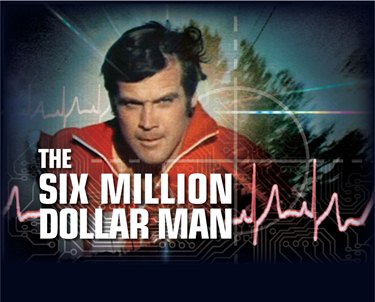
Firstly, Larry worked with Majors in an episode of Six, entitled, The Ghostly Teletype, in which he had a fairly large guest role at what was a very early period in his career. The reason Larry was selected to appear in this episode was due to his combined talents as a magician and actor. Majors' Steve Austin character required the skills of a magician, who would be able to assist him in thwarting evil, mind-controlling twins. As Larry explains, working on this Sixsegment was "fun, though it started out a little rocky."
The first day Larry was on the set, he walked up to Majors who, between shots, was on the telephone. When the Six Million Dollar star hung up the receiver, Larry walked up to him and introduced himself. As Larry recalls, Majors just looked at him and didn't even acknowledge his presence. Majors then picked up the phone again, called the main office, and Larry - who stands 6'4" - was convinced it was because he was 2 ½ inches taller than the Million-aire Majors.
Larry laughs about it now, because he can understand Majors' superhero stance may have felt threatened or at least dwarfed on-screen by a significantly taller guest-actor on his show. "But he could have handled it a little bit better," Larry relays, "maybe if he'd slipped away and made the phone call somewhere else instead of just in front of me. He was just very overt about his displeasure."
However, Larry surmises the decision-makers on the other end of the phone probably told Majors, "Look - the guy can act and he can do all the magic tricks that we need for this episode, and he's hired."
Fortunately, after that somewhat tense initial meeting, Larry says the rest of the shoot was "quite pleasant."
Another classic TV show in which Larry appeared was somewhat related to Majors, in the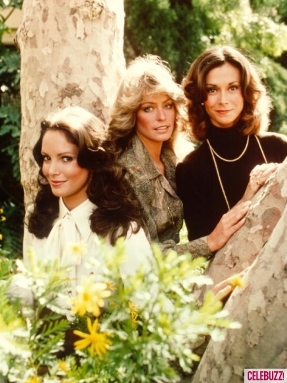 guise of the original Charlie's Angels, which also aired on ABC in the mid-1970s - and which featured Majors' then-wife and soon-to-be historical figure, Farrah Fawcett. Larry enjoyed working on Angels, calling it "a great opportunity." This particular guest-shot transpired on the heels of Larry receiving his Screen Actors Guild card, which was a result of his serving as technical advisor on The Magician, which aired around the same time as Six and Angels.
guise of the original Charlie's Angels, which also aired on ABC in the mid-1970s - and which featured Majors' then-wife and soon-to-be historical figure, Farrah Fawcett. Larry enjoyed working on Angels, calling it "a great opportunity." This particular guest-shot transpired on the heels of Larry receiving his Screen Actors Guild card, which was a result of his serving as technical advisor on The Magician, which aired around the same time as Six and Angels.
The Magician was also one of the catalysts that brought Larry to Los Angeles in the early 70's , under the employ of Mark Wilson, who was then as Larry calls him, the "David Copperfield of television." Wilson had had a one-hour magic series ten years prior that aired on CBS Saturday mornings for approximately four years. It was titled The Magic Land of Allakazam, and it was essentially a live-action, magic/variety show with cartoons dispersed throughout. Wilson was later commissioned by Paramount to be the technical advisor on The Magician, a position that he largely turned over to Larry.
"So," Larry relays, "I was on the Paramount lot every day teaching Bill Bixby magic on the set, serving as his personal, off-camera (and sometimes on-camera) magic coach" - which brings us back to Charlie's Angels.
After The Magician disappeared off NBC, Larry decided he wanted to phase magic out of his career completely, and give himself over to acting full-throttle. By the time he actually accomplished this, Bixby had himself changed career focus. He became a director. And one of his assignments was for an episode of Charlie's Angels, for which he remembered that Larry was moving into acting.
Ultimately, it was Bixby who had suggested to NBC higher-ups that Larry become his on-screen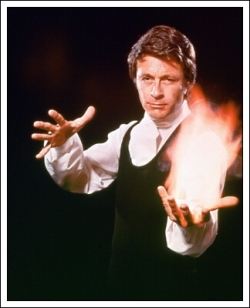 assistant within the premise of The Magician, and now he was casting Larry for a role on ABC's Angels. It was a first season episode that featured the original three Angels, Farrah, Kate Jackson and Jaclyn Smith, the latter with whom Larry performed directly. "It was a fun scene with Jaclyn," he explains. "I played a porno filmmaker, as the Angels were trying to bust up a porno film ring. And she posed as a wanna-be actress who was willing to break into show business at any cost."
assistant within the premise of The Magician, and now he was casting Larry for a role on ABC's Angels. It was a first season episode that featured the original three Angels, Farrah, Kate Jackson and Jaclyn Smith, the latter with whom Larry performed directly. "It was a fun scene with Jaclyn," he explains. "I played a porno filmmaker, as the Angels were trying to bust up a porno film ring. And she posed as a wanna-be actress who was willing to break into show business at any cost."
Interesting, that such an edgy episode would be helmed by Bixby who, before The Magician, was a regular on family shows like My Favorite Martian, The Courtship of Eddie's Father, and The Incredible Hulk, none of which he ever mentioned while working with Larry, on Angels or The Magician. "He was not the type of person who sat around and reminisced on the set," Larry explains. "He was always in the moment. He loved doing The Magician. He loved learning the magic and he finally directed an episode, at the end of the season, which was his first directing job ever."
Either way, as Larry goes on to explain, Bixby was a man of integrity, and was "very invested" in making a success of whatever assignment he tackled, as an actor or director. "There wasn't a lot of down-time to sit around and chat about old times, especially with someone like myself, who was so new to the business. I wouldn't have been the kind of guy that he would engage with in that kind of conversation."
But they did sit around and practice a lot of magic tricks, at least on the set of The Magician.
It may be interesting to note at this juncture that Larry is not related to actor/magician Harry Anderson, who is best known from his starring role in the classic TV show Night Court, which ran on NBC in the 1980s. "It's just a bizarre coincidence," Larry says of the similarities between him and Harry. "We're both tall and WASPy guys who act, do magic and have sound-alike names."
However, Larry and Harry did end up working together on an episode of Court. And as Larry remembers, "We actually had an opportunity to sit around and do card tricks" in between rehearsing and shooting scenes.
Another show Larry cut his acting teeth on was ABC's big 1970s hit, Happy Days. As part of his regimen to become a legitimately trained actor, he enlisted in The Harvey Lembeck Workshop. Lembeck was an actor who appeared as Eric Von Zipper in the classic Beach Party films (directed by William Asher of Bewitched). According to Larry, Lembeck (who was also the father of actor/director Michael Lembeck) was "the go-to guy in Hollywood for anyone who wanted to get into comedy. And literally anyone who was anyone in comedy trained in his workshops."
As such, in the course of doing that workshop, various producers and casting people would drop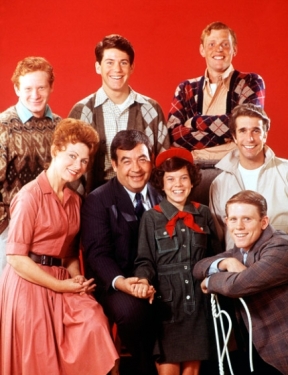 in and sort of mine any potential talent that might be there. And one of those casting directors was Bobby Hoffman, who was responsible for shows like Happy Days, its hit spin-off, Laverne & Shirley, and a number of other Paramount sitcoms. And Hoffman cast Larry in Days, for which he ultimately performed in two episodes. In the first one, he appeared in a smaller role as "crazy college buddy" to the character played by Ted McGinley (who had replaced Ron Howardafter he left the series). Then a year or so later, Larry was hired again for a substantially larger part, playing a character who posed a threat to Scott Baio's Chachi, who in this segment, was the star of a high school play directed by The Fonz (Henry Winkler), and which also featured Joanie(Erin Moran).
in and sort of mine any potential talent that might be there. And one of those casting directors was Bobby Hoffman, who was responsible for shows like Happy Days, its hit spin-off, Laverne & Shirley, and a number of other Paramount sitcoms. And Hoffman cast Larry in Days, for which he ultimately performed in two episodes. In the first one, he appeared in a smaller role as "crazy college buddy" to the character played by Ted McGinley (who had replaced Ron Howardafter he left the series). Then a year or so later, Larry was hired again for a substantially larger part, playing a character who posed a threat to Scott Baio's Chachi, who in this segment, was the star of a high school play directed by The Fonz (Henry Winkler), and which also featured Joanie(Erin Moran).
As Larry explains, "I was the dashing actor that had moved away from Milwaukee , and went to Hollywood and did some commercials," one of which was a famous Brylcreem commercial. And at some point in the episode, Winkler's Fonzie says to Larry's character, "Hey – aren't you that guy in that Brylcreem commercial?"
"It was a nice big part and very campy and lots of fun," Larry relays. "And I of course had a great time with the cast."
By this time, Larry was no longer attending the Harvey Lembeck's classes, and was teaching his own workshop, which a few of the Happy Days cast would later attend.
But it was in the Lembeck workshop that Larry befriended fellow classmates like Robin Williams, who found fame on ABC's Mork& Mindy (another spin-off from Days), and John Ritter, who became the star of ABC's super hit, Three's Company - and with whom Larry would perform on Life With Lucy (as Lucille Ball was a huge fan of Ritter's slapstick talent).
Larry says it was wonderful to work with his friend Ritter on Life With Lucy (which, this year, is celebrating the 25th Anniversary of its debut), but he says working with that show's red-headed comedic legend became "the greatest thrill I could ever have. It was a penultimate moment in any actor's career…to be chosen by Lucy."
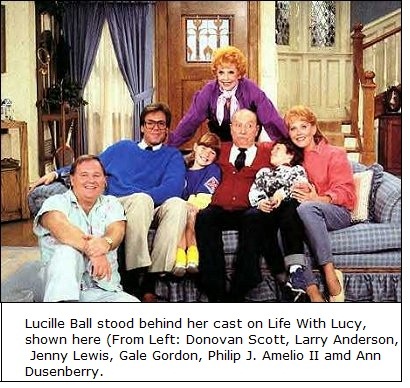
"And I truly was chosen by Lucy," he explains. "I was auditioning against lots of other guys, some of whom had come off recent TV series, and they had substantially more experience than I did, in terms of their track record. But, I had had all those years with Harvey Lembeck and the improv-training under my belt. I also had many years as a stand-up comedy magician. So I was skilled. I just didn't have the resume that a lot of the guys the network was bringing in to the audition had."
"But you know how the networks think" he goes on to say. "You want to try to bring in somebody that has a following. They have to have a high TV "Q-Score"…a strong recognizability factor."
But each time he'd receive another call-back, he'd say to himself, "I can't believe this is happening."
Then, when Lucy herself started showing up at the auditions, he says it got a little more intimidating. "It got down to where the room was no longer just the casting director, and a few of the producers. Now it was Aaron Spelling, E. DukeVincent (who worked with Spelling on shows like Dynasty), network executives, Lucy and Gary Morton (her second husband and the show's producer)."
Through it all, Larry remained calm and collected, and decided to bring some additional expertise into each audition. "I needed to figure out how to bring something fresh each time," he says. "Even if it was it was just a small gesture or look, a double-take or just something that was different."
Lucy took notice and she later relayed that to Larry. As he recalls, "She told ABC execs 'This is the guy. He may not have the resume, but he's got the improv background. And this is who I want playing my son-in-law.'"
As Larry continues to explain, "Aaron acceded to that decision, and hired me. And suddenly I found myself in a series, every day going to work with Lucille Ball. It was just bliss…a fantasy."
Unfortunately, reality soon set in, as he realized that, after a time, hardly any of the episodes were staged around his character. "I really started to feel like I was a piece of the furniture," he says. "As time went on, it became very apparent that, probably out of most everyone else in the cast, they just didn't know what to do with my character. Donovan Scott, whose character worked at the hardware store, got to be in every episode with Curtis (portrayed by Ball's long-stoic sidekick Gale Gordon). So, his character was assured some business. But I was the father who didn't have a job…the character just wasn't fleshed out. So it was a little less fulfilling than I would have liked in terms of getting some scenes. I don't think Lucy and I ever had a scene alone in a room that lasted more than a line. But I was still grateful to be there. And it was a thrill."
However, it was no secret that the scripts were not up to snuff. "We were all generally disappointed in the scripts," Larry admits. "I can't speak for Lucy, but many in the cast were not happy with the quality of the writing. We understood why Lucy had wanted Bob Carroll, Jr.and Madelyn Pugh Davisas her security blankets, having developed and written her three previous series (I Love Lucy, The Lucy Show, Here's Lucy), all of which were very successful. But I think where TV sitcoms had developed over 35 years to a higher level of sophistication, perhaps the audience felt they were kind of doing the same ol' silly stuff and maybe not quite as good.
"Although Lucy herself was still brilliant at her age, I think the show needed a more modern approach and maybe fresh eyes. So, in retrospect, Bob and Madelyn were probably not the correct choice."
Yet, Lucy embraced Life With Lucy with an energy and thrill unlike any other show she had done. She was so happy to be working with young people. She delighted in everyone's participation, be it the actors or any member of the production team. She was simply happy to be working again, and she gave herself over completely to the show. "She loved doing the show," Larry confirms. And ultimately, there were many reasons why Life was cut short (only 13 episodes were taped – of which 8 actually aired).
"I think in some ways Gary Morton was problematic," Larry speculates, "and maybe he was one of the reasons the network pulled the plug. He insisted on being the producer. He insisted on doing the editing, (which was less than adept). He also insisted on doing the warm-ups (for the audience). And called the shots on God knows how many other things. The show had his finger prints on everything. I mean, he was a pleasant enough guy, but he was not skilled in all the areas that he thought he was, and the show suffered because of it."
There were other reasons that Life proved challenging for Lucy. At the time, Desi Arnaz, her former business and marriage partner, was very ill and, as Larry relays, "the handwriting was on the wall. He wasn't going to last long, and he died shortly after the show was canceled. So there were days when she came in and you could see that she was really down and depressed. It must have been tough for her, too, because she was married to Gary at the time, and all the feelings that she had for Desi, all the years they had spent together…everything they went through…all the reminiscing. I'm sure she was very conflicted about a lot of things. To then have the responsibility of the show? Well, it just had to be very overwhelming for her."
Still, there were many positive developments that came from and were delivered by Life With Lucy.
Q. The character of Lucille Barker seemed to have more depth and texture than Ball's previous small-screen personas of Lucy Ricardo, Lucy Carmichael or Lucy Carter.
A. "Yes," Larry says in agreement. "That may be partly a result of Bob and Madelyn bringing in a younger staff of writers to add a flavor they might not have ordinarily contributed. They obviously went along with the new concepts and approved them, and those additional writers – and their contributions – indeed made the show richer."
Q. Still, one can't help but wonder if Lucy felt responsible for everyone in the cast and the crew for the show being canceled.
A. "Oh, God, yes!" Larry says. "She took the weight of the world on her shoulders for that one. She took all the blame, which was just silly, because people can only be blamed and praised for their own performances. And Lucy herself always delivered a good performance. But she took the blame for everything that didn't work, which just displayed how gracious she was. I don't think in her heart she really believed she was responsible, but she did say, 'It's my fault the show has failed.' And everyone on the set was quick to say, 'No, it's not!'"
"She wanted it to succeed so badly for the rest of us," Larry continues, "which she stated on talk shows and a couple of live events. She would say, 'You know – I had my shot and I had my three successful series, and I guess one failure out of four is not so bad, but I wanted this so much for the rest of the cast. This was their big break, and they got dumped after six weeks."
"She had been there," Larry says. "She could put herself in our shoes. She saw the joy we had, and how grateful we were to have finally made it to a network sitcom. She could see all of that in our demeanor, just in our chats on the set, and so forth. She knew it was our big break, and we all just got the rug pulled from underneath us. So, she hurt for us, which just shows how empathetic and warm and beautiful a person she was…to feel more of the loss for us than for herself. She was a very special person."
Q. So, Ball wasn't as demanding to work with as she had been notably so on previous shows?
A. "I didn't have that long-time frame of reference," Larry explains. "That was certainly the lore or the legend…that she was very demanding and hard to work with. And yet, I'm very much of that same mind. I'm a perfectionist. So, to me, that didn't seem hard to deal with. It seemed absolutely right. If something was off, she just wasn't going to allow it to stay that way. She was going to correct it. And she made no bones about being the person who said it. If the director didn't speak up then she would. She would usually defer or allow (director) Marc Daniels, or whoever was directing the right to correct something. But if they didn't, or they were busy with something else, she might just grab you by the shoulders and say, 'You've got to turn out! (face the audience/camera). The audience is out there! It's not here!'"
"And if you swallowed a line of dialogue she'd say, 'What?! Speak up!' And you knew the word 'what" was not in the script. She'd bark, 'You better say it louder, because I'm not going to give you my next line until I can actually HEAR your line!'"
Yet, Larry found that interplay "totally charming."
Overall, Larry says Lucy wanted to "give her fans everything that she had been giving them for the thirty or so years prior. The sad fact is even if she had done it with all of the skill and timing that she had (on I Love Lucy, decades before), the audience still perceived a person in her late 70s trying to live up to her past. So, it felt somewhat uncomfortable watching it, because you now have a certain element of concern. As if to say, 'She's in that chair bouncing up and down she's gonna' get hurt! She's trying too hard.' So I don't think there was any way she could have performed the way she used to as Lucy Ricardo. There was just no way to match it."
Somehow, however, Gale Gordon managed to retain the energy and verve that he had brought to countless Lucy shows in the past.
"What a guy!," Larry says of the actor who played his father on Life With Lucy. "I've never seen a more even-tempered man. For as brilliant as he was, he was the kind of person that if you walked past him on the street, you'd think he had no personality whatsoever. He's just a normal looking guy. He could be a real bank president (just like his Mr. Mooney character on The Lucy Show). Yet, he was a brilliant comedian. And just as sharp and witty and delightful a guy as you ever want to meet."
"What was so funny about him," Larry goes on to say, "is that he'd arrive on the set, and he would just suddenly turn on and be this great performer. You just couldn't match the guy. You couldn't try to top him. Because when Gale was 'on' you just knew he was going to steal the scene. And then after he was done, he would just walk off the set and read his book, and he just became the most mild-mannered and shy type of guy.
"If you would engage him in conversation he would always talk, and be very pleasant, and have something witty to say. But he just kind of enjoyed his quiet time. And then he would go back on stage and be Mr. McGibbon, Mr. Carter or Mr. Mooney, or whatever role he was playing. His transformation from on set to off and back was simply a remarkable thing to watch…the two sides of Gale Gordon…the performer and the person."
And where does that come from?
"I guess," Larry starts to explain, "from all the years of experience and the sheer love of what he did. I mean when you'd look at him, you'd never think he was a particularly fit guy. You know, he was always kind of round and portly. But my lord – he would never tire out. He was there on the set until the last pick-up (shot) was done, even if we went really late, he would be just as fresh as everyone else…or fresher."
Fortunately, Gordon lived a long and happy life.
With regard to Larry's astounding success ratio, it appears he is following in his on-screen father's fortunate footsteps.
"When I look back," Larry concludes of an eclectic existence that has taken him through, around and beyond classic television, "I've had the opportunity to perform with, for and get to know people like Paul McCartney, John Lennon, Stevie Wonder, Cat Stevens, Johnny Carson, Lucille Balland many more entertainment superstars. How great is that for a kid from Minnesota?"
All in all, a life and career certainly worthy of one so talented a renaissance man as Larry Anderson.
Herbie J Pilato is a Writer/Producer who has worked for Syfy, A&E, TLC, Bravo, The Discovery Channel, Universal, Warner Bros. and Sony. Herbie J is the author of a number of acclaimed TV tie-in books (TheBionicBook,Life Story - The Book of Life Goes On, TheBewitchedBook,Bewitched Forever, TheKung FuBook of Caine,TheKung FuBook of Wisdom, and NBC & ME: My Life As A Page In A Book). Herbie J is also the Founder and Executive Director for The Classic TV Preservation Society (a nonprofit organization dedicated to closing the gap between positive TV shows and education), the Creative Director for Erie Street Entertainment (a TV production company that is geared toward sci-fi/fantasy, and family-oriented material), and appears frequently on TV in shows, like the TV Guide Channel's new series, 100 Moments That Changed TV (now airing every Sunday night in October). For more information, please log on to www.ClassicTVPS.blogspot.com or www.ErieStreetEntertainment.blogspot.com, or contact Herbie J directly via hjpilato@yahoo.com.
Read all Herbie J's MediaBizBloggers commentaries at Herbie J's Classic TV Corner.
Check us out on Facebook at MediaBizBloggers.com
Follow our Twitter updates @MediaBizBlogger
The opinions and points of view expressed in this commentary are exclusively the views of the author and do not necessarily represent the views of MediaBizBloggers.com management or associated bloggers. MediaBizBloggers is an open thought leadership platform and readers may share their comments and opinions in response to all commentaries.


